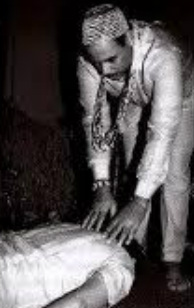Kinship Between Godparents and Godchildren
|
Once a commitment has been made, it has to be honored. Godparents and godchildren who separate due to quarrels or abuse of some kind lose prestige in the eyes of the religious community, and often suffer negative spiritual consequences as a result. It means breaking the connection in a religious lineage, and in some cases, breaking the connection to the Orichas themselves. If a godparent dies, the godchild needs to consult through divination with the Orichas and with his Eledá (his own head) to find a suitable elder in his religious lineage who can take on that role, unless by that time he himself has become a religious elder. Elder status is measured not by chronological age of the individual but by the number of years he has in Ocha. For example, a person who was initiated at age 50 may be "younger" in the religion than a 30-year old who was initiated at age 15. The godparent will always have more years in Ocha than the godchild, and therefore will be an "elder," even when the godchild is older than the godparent in actual chronological years.
|
Godparents Are Figures of Authority

An Initiate Salutes His Godfather
Mutual respect is central to the success of a godparent-godchild relationship. Initially, when the godchild is first learning about the religion, he must respect and obey what the godparent tells him, like a child who's learning from his parents how to negotiate the basic steps in life that take us from infancy to adolescence. In the early years of the godchild-godparent relationship, the godchild will often be told to be quiet, observe, and do what his godparent tells him to do. When he asks questions, people in his religious community will tell him: ask your godfather or your godmother. The godchild is scolded for saying too often "I know," or for claiming to know more than he does. Repeatedly, he's told to listen, because he can learn more from listening than from talking. He can learn by observing, and if he's too busy talking, he'll miss what he needs to see. By making the godchild reliant on the godparent for knowledge and training, the godchild learns to build a relationship of trust with the godparent. Without trust and obedience, religious training can't take place, and the godchild can't evolve. Ethical godparents won't abuse this imbalance of power in the relationship, because the godparent-godchild bond is sacred, like that of blood ties between parents and children. The spiritual growth of the godchild will ultimately reflect well on the godparent, if the godchild is nurtured and educated in the right way. A good Padrino or Madrina will take pride in the godchild's accomplishments, but only after the godchild has put in the time, effort and work to create a solid foundation on which to build his knowledge.
Ethical Behavior For Godparents

The Godparent Relationship Is Sacred
There are ethical codes that govern how godparents should interact with godchildren. These can vary from house to house, but generally it's understood that sexual relations between godparent and godchild are taboo. It's equally forbidden for the godparent to mentally, emotionally or physically abuse the godchild in any way, including making unreasonable demands for money, or charging excessive amounts of money for religious ceremonies. The godparent is required to ask for a derecho(payment) in exchange for services because he's enlisting the aid of the Orichas, and the Orichas expect payment as a form of tribute to them. However, an ethical godparent won't exceed the normal prices that have been set in his religious community as reasonable and fair. An ethical godparent will openly discuss costs with godchildren before performing any ceremony or service and, when a godchild has a genuine emergency and no money to pay for it, the godparent will help without payment because money isn't the central issue in the relationship. Some of the money collected by the Padrino or Madrina for religious services should be used to pay for ceremonies and celebrations to honor the Orichas, and to attend to the needs of his own Orichas. For most ethical practitioners of Santería, the religion's main purpose is not to make money or abuse power. It's to offer spiritual guidance and to honor the Orichas by keeping the traditions alive.

